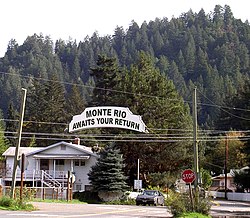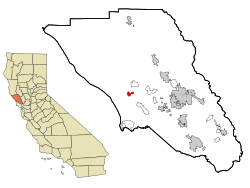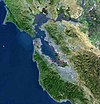Monte Rio, California
Monte Rio | |
|---|---|
 Leaving Monte Rio eastbound on "D" Street | |
 Location in Sonoma County and the state of California | |
| Coordinates: 38°28′13″N 123°0′50″W / 38.47028°N 123.01389°W[1] | |
| Country | |
| State | |
| County | Sonoma |
| Area | |
• Total | 1.977 sq mi (5.119 km2) |
| • Land | 1.904 sq mi (4.930 km2) |
| • Water | 0.073 sq mi (0.189 km2) 3.68% |
| Elevation | 43 ft (13 m) |
| Population (2010) | |
• Total | 1,152 |
| • Density | 580/sq mi (230/km2) |
| Time zone | UTC-8 (PST) |
| • Summer (DST) | UTC-7 (PDT) |
| ZIP code | 95462 |
| Area code | 707 |
| FIPS code | 06-48928 |
| GNIS feature ID | 1656174 |
Monte Rio (Spanish: Monte Río, meaning "River Mountain") is a census-designated place (CDP) in Sonoma County, California along the Russian River near the Pacific Ocean. The town of Guerneville lies northeast of Monte Rio, and Jenner is to the west. The population was 1,152 at the 2010 census, up from 1,104 at the 2000 census. Bohemian Grove is located in Monte Rio.
History
[edit]
Starting in the 1870s, Monte Rio was a stop on the North Pacific Coast Railroad connecting Cazadero to the Sausalito, California ferry. Redwood lumber from local sawmills was shipped to build San Francisco. After the sawmills left, the area became known as Vacation Wonderland with trains transporting San Franciscans to summer cabins and even a seven-story hotel downtown. Portions of the 1942 Academy Award-winning film Holiday Inn were filmed at the Village Inn Resort in Monte Rio. The trains no longer run, and the area now is mainly inhabited by year-round residents.[citation needed]
Despite heavy logging during the second half of the 19th century, the Sonoma Lumber Company preserved a 160-acre (65 ha) grove of old-growth redwood trees, which was sold to San Francisco's Bohemian Club in 1899. The club purchased dozens of other parcels in the area, and now owns 2,712 acres (1,098 ha), which are used for its summer retreats.[4]
Geography
[edit]According to the United States Census Bureau, the CDP has a total area of 2.0 square miles (5.2 km2), of which 1.9 square miles (4.9 km2) is land and 0.07 square miles (0.18 km2), or 3.68%, is water.
Demographics
[edit]| Census | Pop. | Note | %± |
|---|---|---|---|
| 1980 | 1,137 | — | |
| 1990 | 1,058 | −6.9% | |
| 2000 | 1,104 | 4.3% | |
| 2010 | 1,152 | 4.3% | |
| 2020 | 1,080 | −6.2% | |
| 2022 (est.) | 771 | [5] | −28.6% |
| US Census[6] U.S Census 1880-1980,[7] | |||
2010
[edit]The 2010 United States Census[8] reported that Monte Rio had a population of 1,152. The population density was 582.9 inhabitants per square mile (225.1/km2). The racial makeup of Monte Rio was 1,047 (90.9%) White, 10 (0.9%) African American, 6 (0.5%) Native American, 11 (1.0%) Asian, 1 (0.1%) Pacific Islander, 16 (1.4%) from other races, and 61 (5.3%) from two or more races. Hispanic or Latino of any race were 79 persons (6.9%).
The Census reported that 93.6% of the population lived in households and 6.4% lived in non-institutionalized group quarters.
There were 576 households, out of which 85 (14.8%) had children under the age of 18 living in them, 151 (26.2%) were opposite-sex married couples living together, 43 (7.5%) had a female householder with no husband present, 32 (5.6%) had a male householder with no wife present. There were 42 (7.3%) unmarried opposite-sex partnerships, and 37 (6.4%) same-sex married couples or partnerships. 247 households (42.9%) were made up of individuals, and 61 (10.6%) had someone living alone who was 65 years of age or older. The average household size was 1.87. There were 226 families (39.2% of all households); the average family size was 2.54.
The population was spread out, with 132 people (11.5%) under the age of 18, 63 people (5.5%) aged 18 to 24, 253 people (22.0%) aged 25 to 44, 528 people (45.8%) aged 45 to 64, and 176 people (15.3%) who were 65 years of age or older. The median age was 50.7 years. For every 100 females, there were 119.8 males. For every 100 females age 18 and over, there were 125.2 males.
There were 930 housing units at an average density of 470.5 per square mile (181.7/km2), of which 56.9% were owner-occupied and 43.1% were occupied by renters. The homeowner vacancy rate was 3.7%; the rental vacancy rate was 9.1%. 57.0% of the population lived in owner-occupied housing units and 36.5% lived in rental housing units.
2000
[edit]As of the census[9] of 2000, there were 1,104 people, 549 households, and 233 families residing in the CDP. The population density was 753.5 inhabitants per square mile (290.9/km2). There were 807 housing units at an average density of 550.8 per square mile (212.7/km2). The racial makeup of the CDP was 91.76% White, 0.72% African American, 0.54% Native American, 0.72% Asian, 0.09% Pacific Islander, 1.99% from other races, and 4.17% from two or more races. Hispanic or Latino of any race were 7.34% of the population.
There were 549 households, out of which 19.9% had children under the age of 18 living with them, 24.0% were married couples living together, 12.6% had a female householder with no husband present, and 57.4% were non-families. 41.0% of all households were made up of individuals, and 7.7% had someone living alone who was 65 years of age or older. The average household size was 2.01 and the average family size was 2.75.
In the CDP, the population was spread out, with 18.3% under the age of 18, 5.2% from 18 to 24, 30.3% from 25 to 44, 35.1% from 45 to 64, and 11.2% who were 65 years of age or older. The median age was 44 years. For every 100 females, there were 110.3 males. For every 100 females age 18 and over, there were 113.7 males.
The median income for a household in the CDP was $38,299, and the median income for a family was $46,336. Males had a median income of $29,135 versus $28,750 for females. The per capita income for the CDP was $20,262. About 12.1% of families and 16.0% of the population were below the poverty line, including 22.7% of those under age 18 and none of those age 65 or over.
Government
[edit]In the California State Legislature, Monte Rio is in the 2nd Senate District, represented by Democrat Mike McGuire, and in the 2nd Assembly District, represented by Democrat Chris Rogers.[10]
In the United States House of Representatives, Monte Rio is in California's 2nd congressional district, represented by Democrat Jared Huffman.[11]
Education
[edit]The school districts are Monte Rio Union Elementary School District and West Sonoma County Union High School District.[12]
References
[edit]- ^ "US Gazetteer files: 2010, 2000, and 1990". United States Census Bureau. February 12, 2011. Retrieved April 23, 2011.
- ^ "2010 Census U.S. Gazetteer Files – Places – California". United States Census Bureau.
- ^ "Monte Rio". Geographic Names Information System. United States Geological Survey, United States Department of the Interior. Retrieved April 17, 2015.
- ^ Phillips, Peter Martin (1994). A Relative Advantage: Sociology of the San Francisco Bohemian Club (Ph.D.). Sonoma State University. p. 22. hdl:10211.3/143729. Archived from the original on July 22, 2012.
- ^ "ACS Survey Population Estimate 2022".
- ^ "Census of Population and Housing". Census.gov.
- ^ "Population Totals by Township and Place for California Counties: 1860 to 1950". dof.ca.gov.
- ^ "2010 Census Interactive Population Search: CA - Monte Rio CDP". U.S. Census Bureau. Archived from the original on July 15, 2014. Retrieved July 12, 2014.
- ^ "U.S. Census website". United States Census Bureau. Retrieved January 31, 2008.
- ^ "Statewide Database". UC Regents. Archived from the original on February 1, 2015. Retrieved December 5, 2014.
- ^ "California's 2nd Congressional District - Representatives & District Map". Civic Impulse, LLC. Retrieved March 8, 2013.
- ^ "2020 CENSUS - SCHOOL DISTRICT REFERENCE MAP: Sonoma County, CA" (PDF). U.S. Census Bureau. Retrieved December 7, 2024. - Text list


